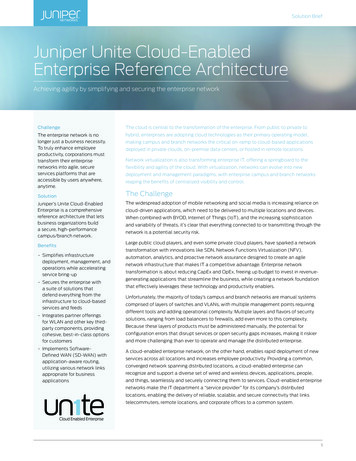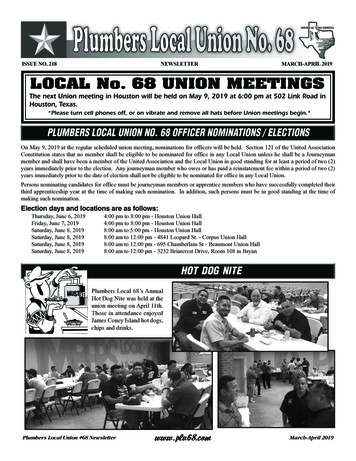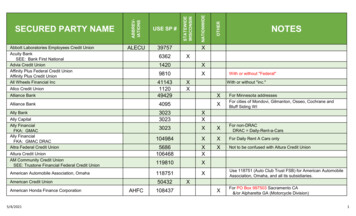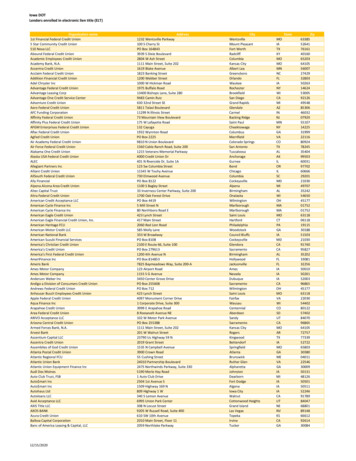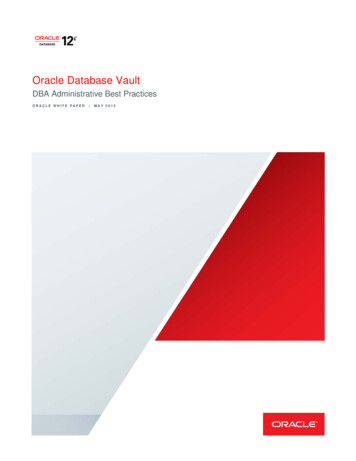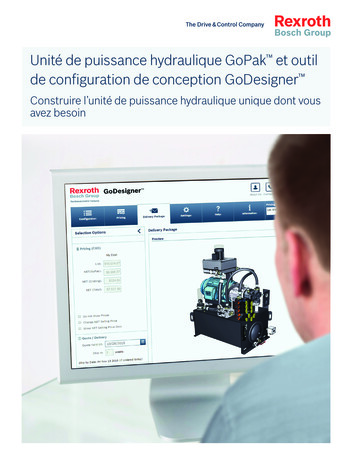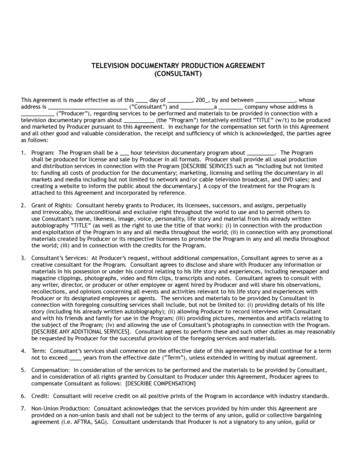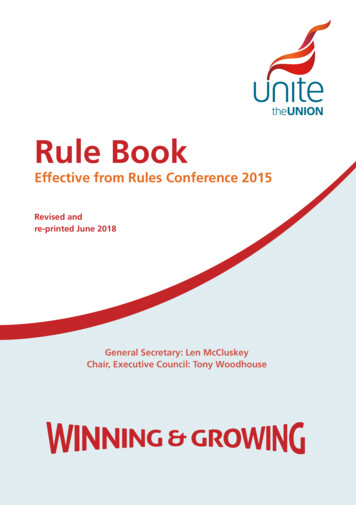
Transcription
Rule BookEffective from Rules Conference 2015Revised andre-printed June 2018General Secretary: Len McCluskeyChair, Executive Council: Tony Woodhouse
UNITE RULE BOOKCONTENTSRULE 1RULE 2RULE 3RULE 4RULE 5RULE 6RULE 7RULE 8RULE 9RULE 10RULE 11RULE 12RULE 13RULE 14RULE 15RULE 16RULE 17RULE 18RULE 19RULE 20RULE 21RULE 22RULE 23RULE 24TITLE AND REGISTERED OFFICEOBJECTSMEMBERSHIPMEMBERSHIP CONTRIBUTIONS and BENEFITSOBLIGATIONS OF MEMBERSLAY OFFICEINDUSTRIAL/OCCUPATIONAL/PROFESSIONAL SECTORSREGIONSYOUNG MEMBERSMEMBERS IN RETIREMENTEQUALITIESPOLICY CONFERENCERULES AMENDMENTEXECUTIVE COUNCILGENERAL SECRETARYELECTION OF EXECUTIVE COUNCIL MEMBERSAND THE GENERAL SECRETARYBRANCHESWORKPLACE REPRESENTATIONFUNDSASSETS AND TRUSTEE PROVISIONEXPENSESPOLITICAL ORGANISATION – THE LABOUR PARTYPOLITICAL 45668
RULE 25REPUBLIC OF IRELAND – STRIKES AND OTHERINDUSTRIAL ACTIONRULE 26 ISLE OF MANRULE 27 MEMBERSHIP DISCIPLINERULE 28 COMMUNITY/STUDENT MEMBERSRULE 29 SCOTLANDRULE 30 GIBRALTARRULE 31 OFFICIAL ANNOUNCEMENTSRULE 32 VOLUNTARY DISSOLUTIONRULE 33 EXERCISE OF UNION POWERS IN THE PENSION SCHEMESEXECUTIVE COUNCIL GUIDANCE – NOTICE TO MEMBERSAPPENDIX TO RULE BOOK – LIST OF INDUSTRIAL SECTORS7173747879818283848586
UNITE RULE BOOKRULE 1TITLE AND REGISTERED OFFICE1.1The Union formed under these rules (hereinafter called the Union) shall beknown by the title of “Unite the Union”.1.2This Rule Book applies to all members of the Union, and represents theentirety of the rules applicable to members of the Union, save as explicitlyprovided for under this Rule Book.1.3The Registered Office of the Union shall be Unite House, 128 TheobaldsRoad, London WC1X 8TN or such other place as may be decided upon bythe Executive Council.1
RULE 22.1OBJECTSThe objects of the Union shall be:2.1.1To organise, recruit and represent workers, and strengthenworkplace organisation to achieve real union power for itsmembers.2.1.2To defend and improve its members’ wages and workingconditions including the pursuit of equal pay for work of equalvalue. To help our members win in the workplace, using theunion’s resources to assist in that process, and to support ourmembers in struggle including through strike action.2.1.3To defend and improve the social and economic well-being ofmembers and their families, both directly and via commensuratepolicies in relation to society both domestically and abroad.2.1.4To have a strong political voice, fighting on behalf of workingpeoples’ interests, and to influence the political agenda locally,regionally, nationally and internationally, so as to promote asocialist vision for a more equal society in which wealth is distributed from therich to the poor, including by means of progressive taxationand other regulatory measures to restrict excessive wealth a collective society in which public services are directlyprovided on the basis of public need and not private greed,and a fair system of welfare and benefits to support those inneed public ownership of important areas of economic activity andservices, including health, education, water, post, rail and localpassenger transport.2.1.52To further political objectives including by affiliation to the LabourParty.
UNITE RULE BOOK2.1.6To promote equality and fairness for all, including activelyopposing prejudice and discrimination on grounds ofgender, race, ethnic origin, religion, class, marital status,sexual orientation, gender identity, age, disability or caringresponsibilities.2.1.7To affiliate to the TUC, ICTU, Welsh and Scottish TUCs andother appropriate trade union cooperation/coordination bodiesdomestically and internationally.2.1.8To promote constructive cooperation between trade unionsinternationally to further the interests of members of the Unionand those in other unions in dealing with the direct and indirectimpact of globalisation.2.1.9To promote education and training; both vocational and industrialand otherwise as conducive to these objects.2.1.10 To provide such financial and other benefits and legal assistanceto members as may be specified in these rules.2.1.11 To do all such other things as may in the opinion of the ExecutiveCouncil be incidental or conducive to the attainment of theseobjects.2.1.12 To communicate information to members about union activities,campaigns, services and/or benefits, so as to encourageparticipation and further these objects.3
RULE 3MEMBERSHIP3.1The Executive Council shall define the categories of membership. Wherethe Union organises or represents persons engaged in an occupation orseeks to do so, any person engaged in that occupation shall be eligible formembership of the Union, subject to these rules.3.2There shall be other categories of membership as may from time to timebe determined by the Executive Council. These categories shall include: Retired Members Plus Community/Associate Community/Student Member Back to Work Member Apprentice/Trainee MemberThe Executive Council shall determine the qualifications for membershipof these categories as well as the level of contribution and entitlement tobenefit. Membership of Retired Members Plus and Community/StudentMembership shall not accord an entitlement to vote in any ballot orelection held by the Union other than:I.An election to the office of General Secretary under Rule 15 and16.II.Elections within Retired Members Plus and community/StudentMember structures, or:III.As otherwise specified in these Rules or any ballot or election inwhich all members must by statute be accorded an unconditionalentitlement to vote.Associate Community Members shall have no entitlement to hold anyposition in the union or to participate in any of the union’s structuresbeyond the Community Group/Branch of which they are a membernor shall they be entitled to vote in elections for General Secretary andExecutive Council.4
UNITE RULE BOOK3.3Members of the union who upon retirement wish to remain inmembership but not as Retired Members Plus shall be organised as“ordinary” retired members. Such “ordinary” retired members shall notbe afforded any entitlement to vote in any ballot or election held by theUnion.3.4Any eligible person may apply for membership by completing theappropriate application form agreeing to be bound by the rules of theUnion and submitting it to the Union office or by electronic means asmay be provided for via the Union’s website. An applicant shall becomea member when his/her application has been approved and he/she hasbeen entered into the register of members. Such approval process mayrequire receipt by the Union of the contribution applicable under theserules.3.5Each member must notify the Union’s membership department of anysubsequent change of address, and in the absence of such notice theUnion shall be entitled to treat the address shown on that member’sapplication form as the member’s address for all correspondence.3.6Each member must notify the Union’s membership department of anysubsequent change of workplace or contribution category status.3.7If an applicant has previously been a member of the Union (or any of itspredecessors), the Executive Council may, as a condition of re-admission,require the applicant to pay some or all of any monies owed by theapplicant to the Union (or any of its predecessors).3.8The Executive Council may reject an application if in its opinion theconduct of the applicant has at any time been such as would justify adisciplinary charge under these rules against a member of the Union whobehaved in a similar fashion.3.9Any period of continuous membership of a predecessor union at thepoint of amalgamation or transfer shall count as continuous membershipof the Union for the purposes of these rules.5
3.10 For the purposes of producing a Membership Audit Certificate asrequired by Sections 24ZA, 24ZB and 24ZD of the Trade Union and labourRelations (Consolidated) Act 1992, the Union is required to appoint anassurer. The assurer must be qualified in accordance with Section 24ZBand the appointment and removal of the assurer shall be subject to theprovisions of Section 24ZC of the Trade Union and Labour Relations(Consolidation) Act 1992.6
UNITE RULE BOOKRULE 4MEMBERSHIP CONTRIBUTIONS and BENEFITS4.1It shall be the personal responsibility of the member to maintaincontributions and avoid arrears in all circumstances. Any period duringwhich a member’s contributions are 13 or more weeks in arrears shallbreak continuity of membership for the purpose of the qualificationrequired to be an officer employed by the Union set out in Rule 14 andlose entitlement to vote in any election or ballot held by the Union, savewhere a member establishes to the satisfaction of the Executive Councilthat the arrears arose through no fault of that member. A member whosecontributions are recorded by the Union as more than 39 weeks in arrearswill be excluded from membership by the Union communicating noticeto that effect to the member. A member so excluded from membershipmay apply for reinstatement which may be allowed on such terms as tothe payment of outstanding arrears as the Executive Council may considerappropriate.4.2The Executive Council shall determine the period of membershipnecessary prior to the member attaining eligibility for benefits, and anyperiod during which contributions are in arrears which shall remove sucheligibility.4.3The Executive Council shall determine the level of contributions for eachcategory of membership.4.4The Executive Council shall determine the scope and level of benefits.4.4.1Such benefits may include such things as: DriverCare, funeral,incapacity, personal accident (death, loss of limb/eye, permanentdisability), maternity/adoption, paternity, convalescence,professional liability insurance, etc. Without interference to theoverriding authority granted by this rule to the Executive Co (todetermine the scope and level of benefits), funeral benefit shallbe paid to all non-retired working members as at the 1st Day ofSeptember 2009 at the same rate.7
4.4.28Maximum sum assured. The Union shall not have the power toassure for any member/individual provident benefits amountingto more than 4,000 by way of a gross sum or 825 by way ofan annuity.4.5The Union shall pay dispute benefit in such circumstances and on suchterms as are decided by the Executive Council from time to time.4.6The Union will provide legal assistance, as follows:4.6.1A member who is entitled to benefit who suffers injury or diseasearising out of or in connection with his/her employment (or thedependants of such a member who has died) shall be entitled tosuch legal advice and representation, and on such terms, as theExecutive Council may consider appropriate.4.6.2A member seeking legal assistance must ensure that a request inthe appropriate form is lodged at the appropriate Union officein sufficient time and with sufficient information to enable therequest to be considered and appropriate action taken.4.6.3A member who requires advice and/or representation on aproblem relating to the member’s employment which firstarose at a time when the member was entitled to benefit andwhich cannot be resolved through the member’s workplacerepresentative should refer the matter to the appropriate RegionalOfficer. The Union may provide such advice and/or representationas the Executive Council shall consider appropriate, whether by afull time officer or otherwise, and on such terms as the ExecutiveCouncil shall consider appropriate.4.6.4The Executive Council may provide such additional legal adviceand representation to members and to members’ families as itmay consider appropriate.4.6.5The Executive Council may extend legal assistance to a memberwho is not otherwise entitled to benefits.
UNITE RULE BOOK4.6.6A member who is given advice and/or representation under thisrule shall provide all relevant information and co-operate fullywith the compilation of evidence for any legal proceedings andshall comply with any other obligations and/or conditions setout in any arrangements for the provision of legal assistance. If amember fails to do so or provides false or misleading informationor fails to act upon the advice of those appointed to representhim/her, the Executive Council may at its absolute discretionannul all legal assistance or withdraw any further legal assistanceto that member.4.7The Executive Council shall have discretion to provide additional benefits.4.8Before reinstating a lapsed member’s membership it will be ascertainedthat they have not been previously expelled from the Union. They willalso be advised that they will not receive representation or advice on anyemployment issue that has arisen during the period where the lapse hasoccurred.4.9The Executive Council may provide, agree and permit other organisationsto provide to members and their households insurance, financial,legal, consumer and other services and products and loyalty or othersimilar schemes and Unite may provide information by direct mailing orotherwise to members concerning such services, products and schemes.9
RULE 510OBLIGATIONS OF MEMBERS5.1A member of the Union must comply with these rules and with any dutyor obligation imposed on that member by or pursuant to these ruleswhether in his/her capacity as a member, a holder of a lay office or as afull time officer.5.2A member must not knowingly, recklessly or in bad faith provide theUnion with false or misleading information relating to a member or anyaspect of the Union’s activities.5.3A motion shall not be submitted by or on behalf of the Union or anygroup or body within the Union to an organisation or body outside theUnion if that motion is inconsistent with existing Union policy.5.4When acting as a representative of the Union at a meeting of anorganisation or body outside the Union a member shall speak and vote inaccordance with the policy of the Union and with any decision taken bythe Union’s representatives at that meeting which is consistent with theUnion’s policy.
UNITE RULE BOOKRULE 6LAY OFFICE6.1The Executive Council shall make provision to ensure accountability ofRegional, Industrial and Equalities Executive Council members and thoseExecutive Council members elected pursuant to rule 14 shall meet withtheir respective National Industrial Sector, National Equalities or RegionalCommittees at least four times per year.6.2In order to be eligible to be a candidate for election to the ExecutiveCouncil and/or any committee, council, or other body of the Unionprovided for by these rules, the member in question must be anaccountable representative of workers, with the exception of AreaActivists Committees and Regional Labour Party Liaison Committees andthe young members’ structure, other than the Young Members’ delegateto the Executive Council and Regional Committees as specified elsewherein these rules.6.3The definition of the term “accountable representative of workers” shallbe in the exclusive power of the Executive Council, which is empoweredto take into account changing industrial realities and the unique natureof some industries (e.g. construction, contracting, leisure, rural etc) informulating such a definition. It must nevertheless include Branch officeholders who are in employment when employed by an organisation thatis not Unite the union, shop stewards, health & safety, equalities andlearning representatives elected at their place of work.6.4It is further required that a fair procedure be developed by the ExecutiveCouncil to deal sympathetically with cases where a member’s eligibility tostand for election or continue to hold office may be affected by employervictimisation.6.5The electoral period to hold lay office shall be three years unless otherwiseprovided for under these rules.6.6The Executive Council shall issue guidance to establish the right of recallover members elected to lay office.11
6.7All Unite fulltime officers assigned to the Union’s constitutionalcommittees are responsible for maintaining an up to date record ofconstitutional committee members’ credentials in order to ensurecompliance with Rule 6. This record is to be reported to all constitutionalcommittee meetings and included in the Minutes.6.8To be eligible to stand for election as an accountable representative ofworkers members must be committed to the Objects of the Union asdefined in Rule 2 including strengthening the workplace organisation andresources of the Union.Members who are engaged in the recruitment of members to a unionthat is not Unite the Union are excluded from standing as accountablerepresentatives of workers within Unite the Union.In the case of any such restriction imposed on a member, an appeal maybe made to the Regional Committee in line with the provisions of Rule 27.6.9Members seeking election as accountable representatives of workers musthave made at least thirteen weeks financial contributions and not bemore than thirteen weeks in arrears.This clause may not be applied in the case of newly organised workplaces.12
UNITE RULE BOOKRULE 7INDUSTRIAL/OCCUPATIONAL/PROFESSIONAL SECTORS7.1Members in employment shall be allocated to the Industrial Sector inwhich they are employed. The term ‘Industrial Sector’ is a generic termincluding occupational and professional sectors.7.2There shall be organisation and representation of union members at bothregional and national level by reference to their Industrial Sector.7.3These Industrial Sectors shall be determined by the Executive Council,which shall and after full consultation and approval of the sectors canamalgamate existing sectors as seems expedient on the basis of industriallogic and developing patterns of membership organisation (see appendixfor full current list).7.4Each Industrial Sector shall be led by a National Industrial SectorCommittee, to be elected from the appropriate Regional Industrial SectorCommittees in such proportion, as may be determined by the ExecutiveCouncil. The Executive Council shall have the power to determineadditional special constituencies (which may be on a national basis) wherethey deem it necessary in light of the particular industrial circumstancesof the sector. Regional Industrial Sector Committees shall be elected attriennial meetings of Regional Industrial Sector Conferences. Every electedlay representative (Rule 6 compliant) listed in Rules 17 and 18 is entitledto attend the triennial conference.7.5National Industrial Sector Committees shall enjoy full autonomy in theconduct of their own proper industrial business provided that suchconduct is not inconsistent with the general policy and objectives of theUnion.13
7.6Each Industrial Sector shall hold a national conference, with delegateselected from amongst the membership in that sector, once every twoyears to determine its own industrial policies provided that they are notinconsistent with the general policy and objectives of the Union. Thatthe Executive Council shall determine the size and composition of eachNational Industrial Sector Conference and shall ensure that in each caseit is larger than the number of seats on the corresponding NationalIndustrial Sector Committee.7.7Each Industrial Sector shall, where practicable, be divided into RegionalIndustrial Sectors, in conformity with the territorial Regions of theUnion. There shall be a Regional Industrial Sector Committee in eachRegion where a Regional Industrial Sector is established elected in suchproportion, as may be determined by the Executive Council, to reflectBranch and workplace organisation including geographical and industrialsub-sector distribution of the sector membership.7.8Each National and Regional Industrial Sector Committee shall beempowered to fill vacancies arising from the failure of any Committeemember, without good reason, to attend 3 consecutive Committeemeetings or following the resignation of any member.7.9Members employed in managerial, professional, supervisory, technicaland/or clerical grades may, where appropriate, be organised andrepresented separately from other members in the same sector.7.10 Special sub-sectors and/or advisory committees of Industrial Sectors7.10.1 The Executive Council shall constitute special sub-sectors and/oradvisory committees of Industrial Sectors as may seem expedient,on the basis of company or occupation, and shall have discretionto maintain the autonomy of specific craft or professionalgroupings which may not have the status of industrialcommittees.14
UNITE RULE BOOK7.10.2 The Executive Council may approve byelaws to govern theactivities of a group or association or other body or organisationof members. In the event of a conflict between these rulesand the byelaws of a group or association or other bodyor organisation of members, these rules shall prevail. Anyamendment to the byelaws of a group or association or otherbody or organisation of members shall require the consent of theExecutive Council7.10.3 Any group or association or other body or organisation ofmembers existing immediately before these rules came into forcewhich had its own constitution, byelaws, regulations or rulesshall treat that constitution, those byelaws, regulations or rulesas being byelaws for the purposes of these rules. Accordingly, inthe event of a conflict between these rules and the constitution,byelaws, regulations or rules of a group or association orother body or organisation of members, these rules shallprevail. Further, any amendment to such constitution, byelaws,regulations or rules shall require the consent of the ExecutiveCouncil which may also amend such constitution, byelaws,regulations or rules after consultation with the relevant group orassociation or other body or organisation of members.15
RULE 88.1REGIONSFor the purpose of regional administration the Union shall constituteRegions for Ireland, Scotland and Wales with England divided into 7Regions on the basis of Regional Development Agency boundaries (as at1st January 2006) as follows:North West;North East, Yorkshire and Humberside;West Midlands;East Midlands;South West;South East; andLondon and Eastern168.2Each Region shall have a Regional Committee of lay members electedfrom the Regional Industrial Sector Committees, Area ActivistsCommittees where established, Regional Equalities Committees and asotherwise provided for by these rules in such proportions, as may bedetermined by the Executive Council. Should any seat become vacant onthe Regional Committee, then the Regional Secretary shall write to thenominating committee seeking a replacement delegate.8.3The Regional Committees shall have responsibility for the managementof the Union’s affairs in their Regions in conformity with decisions of theExecutive Council and responsible to it.8.4The Regional Committees shall have their own funds not exceeding 1%of the membership income attributable to members within that Region.Regional Committees shall be responsible for the affiliation of unionorganisations to Trades Councils and appropriate public bodies withintheir Region.
UNITE RULE BOOK8.5Regions shall constitute Area Activists meetings between activists indifferent companies, sectors and Branches, across geographical areaswithin a Region, subject to the approval of the Executive Council. Thefirst of these meetings in an electoral period shall elect Area ActivistsCommittees, the size and composition of which being determined by therespective Regional Committee, subject to the approval of the ExecutiveCouncil. Thereafter Regions may convene further Area Activists meetings,up to four times a year. All activists shall be eligible to stand for electionto Area Activists Committees.8.6The Regional Committee shall meet once a quarter or more frequently if,in the opinion of the Regional Secretary, the business renders it necessary.The Regional Secretary is responsible for convening all meetings.8.7A special Regional Committee meeting can be called by 50% 1 of themembers of the Regional Committee, either by a show of hands at aRegional Committee meeting or by written requisition.8. 8The Regional Committee shall have power to appoint one or moresub-committees from among its members and, except where otherwisedetermined by the Executive Council, shall have the power to delegateto any such sub-committee all or any of its powers including thereinthe conduct of hearings, appeals, inquiries, investigations or any otherproceedings or functions whatever which it is authorised by these rules toundertake.8.9Each Regional Committee shall be empowered to fill vacancies arisingfrom the failure of any Regional Committee member, without goodreason, to attend three consecutive Regional Committee meetings orfollowing the resignation of any member.17
RULE 918YOUNG MEMBERS9.1In each Region there shall be a young members’ forum open to allmembers up to and including the age of 27 in that Region commencingfrom the 2018/21 electoral cycle. (The qualifying age remains at 30 untilthe 2018/21 electoral cycle)9.2The purpose of the young members structure shall be to advocate theindustrial and social interests of young workers, to cement links with theUnion’s industrial and community members youth organizations bothwithin the labour movement and beyond and to promote relevant policiesprovided that they are not inconsistent with the general policy andobjectives of the Union.9.3There shall be conferences in each Region every three years for youngmembers. The Regional Secretary shall be responsible for conveningthese conferences. The Executive Council shall determine the number ofdelegates to the regional conferences and how they shall be appointed orelected.9.4There shall be a Regional Young Members Committee charged withdeveloping, organising and delivering the young members’ strategy inthe Region, elected at the Regional Young Members’ Conference in suchproportion, as may be determined from time to time by the ExecutiveCouncil. The Regional Young Members Committee shall elect a delegateto the Regional Committee.9.5There shall be a national conference every two years for young memberswhich the Executive Council shall be responsible for convening. TheExecutive Council shall determine the number of delegates to the nationalconference and how they shall be appointed or elected.9.6Young member activists are entitled to attend Area Activists Meetingsand to stand for election to at least 2 defined young members’ seats onthe Area Activists’ Committee, elected by young members attending theMeeting.
UNITE RULE BOOK9.7Young members who are also Unite branch CLP GC delegates and upto four nominees (who must be members of the Labour Party) fromthe Regional Young Members’ Committee, elected by members of thatCommittee, are entitled to attend the Regional Labour Party LiaisonConference and are eligible to stand for election to two additional youngMembers’ seats on the Regional Labour Party Liaison Committee.9.8There shall be a Young Members National Committee elected from eachYoung Members Regional Committee in such proportion, as may bedetermined from time to time by the Executive Council.19
RULE 10MEMBERS IN RETIREMENT10.1 Members in retirement may be organised as “retired members plus” oras ordinary retired members. Only “retired members plus” members ormembers in retirement who choose to pay full contributions may holdoffice in any retired members’ structures that the Union may establishwhich shall include attendance at Regional Retired Members’ Conference.Separate arrangements may apply in the Republic of Ireland, ChannelIslands, Isle of Man and Gibraltar.10.2 Unite retired members, working through retired members’ structures,shall campaign for and promote the interests of senior citizens and thecommunities in which they live by working with the wider structures ofthe Union as well as other bodies involved with the retired, cementinglinks with the Union and ensuring support both within Unite and beyond.10.3 The retired members’ structures shall harness the support of retiredmembers in promoting the Union’s political and campaigning objectives.10.4 Retired members may be members of the workplace, local or nationalbranches of the union (as defined in Rule 17) or may be organisedin retired members’ branches. Members in retirement may notsimultaneously be members of more than one branch of the union.10.5 In each Region there shall be a triennial conference of retired membersrepresentatives which shall be defined as officers of Retired Members’branches and retired members who may hold office in other types ofbranch. The Regional Secretary shall be responsible for convening theconference.10.6 There shall be Regional Co-ordinating Committees for retired members,elected from the regional conference, in such proportion as may bedetermined by the Executive Council. These Committees shall elect anobserver delegate to their respective Regional Committee of the union asa whole.20
UNITE RULE BOOK10.7 Retired member activists are entitled to attend the triennial Area ActivistsMeetings and general Area Activists Meetings, and to stand for electionfor up to 2 defined retired members’ seats on Area Activists Committees,elected by retired members attending the meeting.10.8 Retired members who are also Unite branch CLP GC delegates plus upto four nominees (who must be a members of the Labour Party) fromthe Regional Retired Members’ Co-ordinating Committee, elected by themembers of that Committee, are entitled to attend the Regional LabourParty Liaison Conference and are eligible to stand for election to at leasttwo additional retired members seats on Regional Labour Party LiaisonCommittees.10.9 There shall be a national conference of retired members’ representativesheld every two years. The Executive Council shall be responsible forconvening this conference which shall be made up of delegates electedby the regional retired members’ structures.10.10 There shall be a National Commi
1.2 This Rule Book applies to all members of the Union, and represents the entirety of the rules applicable to members of the Union, save as explicitly provided for under this Rule Book. 1.3 The Registered Office of the Union shall be Unite House, 128 Theobalds Road, Lond

